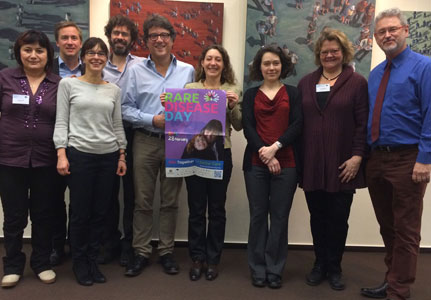The EUCERD is dead, long live the European Commission Expert Group on Rare Diseases!
February 2014 The inaugural meeting of the Commission Expert Group on Rare Diseases took place at the European Commission in Luxembourg on 11-12 February 2014.
The inaugural meeting of the Commission Expert Group on Rare Diseases took place at the European Commission in Luxembourg on 11-12 February 2014.
This group of experts takes over the responsibilities of the European Union Committee of Experts on Rare Diseases (EUCERD) of providing advice to the European Commission in supporting the implementation of the Commission Communication “Rare Diseases: Europe’s challenges” (11 November 2008), and the Recommendation of the Council of the European Union on an action in the field of rare diseases (8 June 2009).
The main change is that the new group of experts is now chaired by the Commission. At the inaugural meeting, there was a high representation of the different Directorate-Generals of the EC: different units of DG Health and Consumers, Research and Innovation, Enterprise and Industry and the Joint Research Centre. The Chair of the Committee for Orphan Medicinal Products of the European Medicines Agency was also present.
The newly appointed Commission Expert Group on Rare Diseases brings together representatives of the 28 EU Member States and of Iceland, Norway and Switzerland, as well as representatives from the following stakeholder groups: rare disease patient umbrella organisations, European associations of producers of products or service providers, European professional associations or scientific societies acting in the field of rare diseases, individuals appointed in a personal capacity as experts having public health or scientific expertise at EU level in the field of rare diseases.
The four patients’ representatives nominated and their alternates are all leaders of rare disease patient associations, covering all parts of Europe and having longstanding experience as patient advocates. They will work in close collaboration together and with EURORDIS, as well as the National Alliances of Rare Diseases, and the European Federations of specific rare diseases, in order to voice patients’ needs and expectations. EURORDIS would like to thank all of these patients’ representatives for their commitment: Amanda Bok, Dorica Dan, Jan Geissler, Lene Jensen, Alastair Kent, Flavio Minelli, Christoph Nachtigäller and Yann Le Cam.
The Commission expert group has a key role in producing recommendations on relevant issues for rare diseases patients. The former EUCERD adopted five Recommendations on quality criteria for Centres of Expertise, European Reference Networks, Rare Disease Registries, Information flow on the Clinical Added Value of Orphan Medicinal Products and finally on 21 core indicators for monitoring national plans for rare diseases. Lastly, the EUCERD adopted an Opinion on New Born Screening.
Over the next two years, the development/implementation of National Plans for Rare Diseases will remain a key and transversal issue. The priorities to be worked on were discussed during the inaugural meeting. These include Specialised Social Services and integration of rare diseases in social policies, information provision systems on rare diseases (including web services and helplines), codification of rare diseases, gene testing and next generation sequencing, registries, guidelines on diagnosis and care, research infrastructures, and European Reference Networks.
The work on these priority issues should lead to future recommendations. EURORDIS will inform its readers on the progress of the Commission Expert Group on Rare Diseases on a regular basis.
Louise Taylor, Communications and Development Writer, EURORDIS
